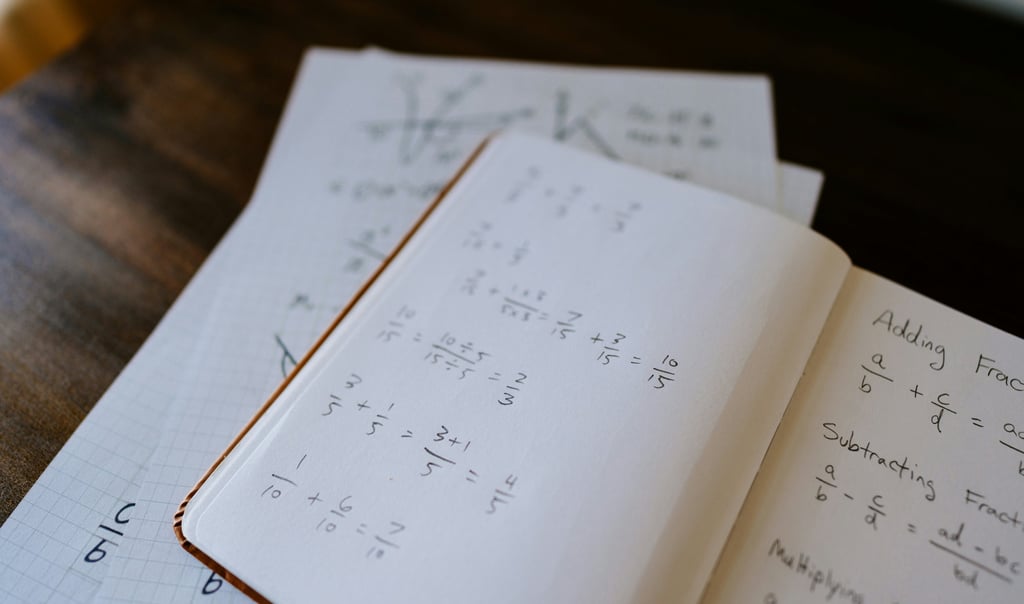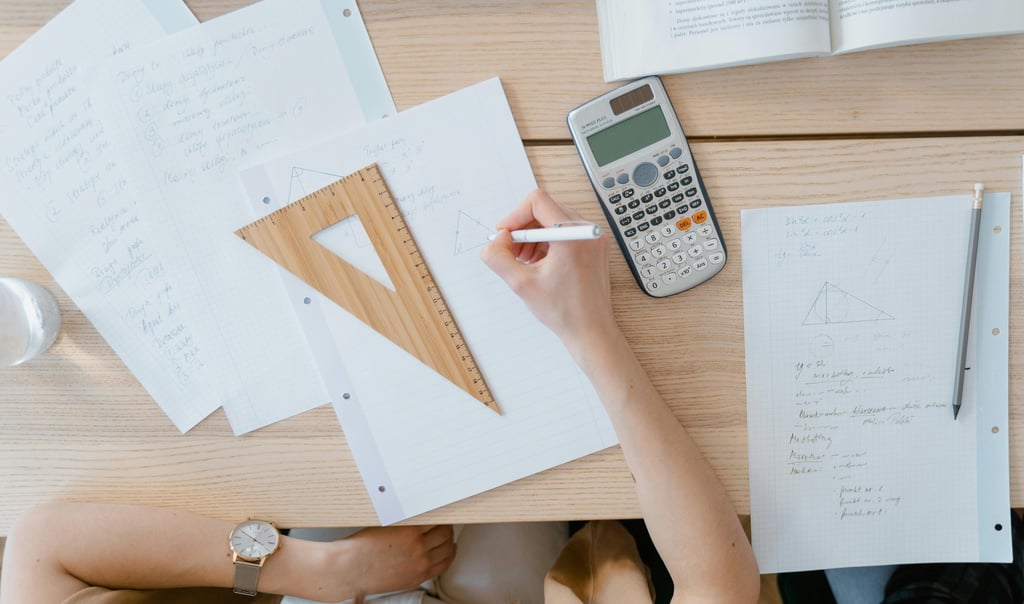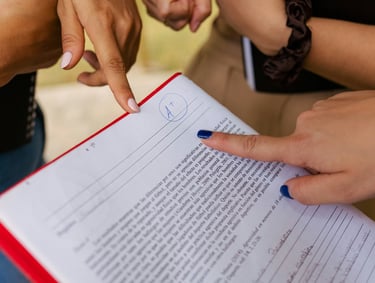How to Use Past Papers Correctly to Boost Your Grades in Cambridge Maths
Discover how using past papers can boost your grades in Cambridge math, improve your exam skills, and build confidence. Learn practical step-by-step strategies to make past papers a powerful study tool to Ace your next Exam.
STUDENTS
Achiever Tandoh
8/15/20258 min read


Howto Boost Your Maths Grades with Past Papers
If you’re aiming to improve your grades in Cambridge IGCSE or AS/A Level Mathematics, there’s one study tool that stands out above almost every other: past papers.
Past papers aren’t just a collection of old exam questions. They are, in many ways, the best way to see the future because they give you an idea of how you’ll be tested, what you’ll be tested on, and how you’ll be expected to answer the question.
If used correctly, past papers can transform your exam preparation from “I’ve studied the syllabus” to “I can confidently tackle the type of problems that will appear in a real exam.”
In this post, I’m going to talk about why past papers are so powerful, how they can help you improve your performance, and the best strategies to get the most out of them. I’ll focus on Cambridge Maths specifically, but the same principles apply across other subjects. The goal is for you to walk away knowing exactly how to turn a stack of past papers into a real boost in your grades.
Why Past Papers Are So Useful


1. They Show You the Exact Exam Style
Cambridge maths questions have a certain “personality”. This means the structure and type of questions are usually the same. The style is often different from the examples you might find in a textbook.
By regularly doing past papers, you’ll get familiar with this style, so nothing feels “new” on exam day.
2. They Train You to Think Like the Examiner
Every past paper is a window into the examiner’s mind. It tells you:
How the different topics are tested.
How marks are distributed.
Which common “twists” they like to add.
For example, in many Cambridge probability questions, the first part might be basic probability, but the second part often introduces conditional probability or an unexpected restriction. By noticing these patterns, you learn to anticipate the “next step” before you even turn the page.
3. They Help You Master Time Management
One of the biggest challenges in Cambridge maths exams is finishing on time without rushing. You might know all the content but still lose marks if you can’t complete all the questions.
Past papers let you simulate the real timing. When you practice under timed conditions, you’ll start to feel how long a 6-mark question should take, and you’ll learn when to move on instead of spending too much time on a single difficult question.
4. They Highlight Your Weak Spots
You might think you understand trigonometry until you meet a tricky past paper question that combines trig with coordinate geometry. Past papers don’t just test individual topics — they test connections between topics.
By reviewing your mistakes, you can see exactly where your understanding is shaky. This makes your study time far more efficient. Instead of simply revising topics you already know, you can focus directly on the skills that will actually improve your grade.
The Best Way to Use Past Papers for Maths


Here’s where most students go wrong: they download a bunch of past papers, do them one after another, and hope for the best. While this is still a good practice because you are at least using past papers to prepare, it is not the most effective way. What you need is a clear process that can help you boost your performance and get the most marks.
Here’s the step-by-step method that will help you maximise your results.
Step 1: Start with Untimed, Open-Book Practice
When you first tackle a new past paper, don’t worry about speed. Focus on accuracy and understanding. Have your formula sheet, notes, and textbook open. This stage is about:
Recognizing the question types.
Figuring out which topic each question is testing.
Checking if you know the first step to take.
For example:
If a question says:
"The curve of a given function intersects the x-axis at three points. Find the coordinates of these points."
Instead of panicking about the timing, think:
“Ah, finding x-intercepts means solving y = 0.”
Factorize, get the solutions, and check them against the mark scheme.
By doing it open book, you give yourself the space to learn the patterns without the pressure of the clock.


Step 2: Review with the Mark Scheme — In Detail
Cambridge mark schemes are not just for checking your total score. They show you exactly how marks are awarded.
For example:
If the question is worth 4 marks, the mark scheme might show:
1 mark for correct substitution.
1 mark for simplifying correctly.
2 marks for the correct final answer.
If you got the final answer wrong, you could see if you lost marks for a silly arithmetic mistake or for a bigger misunderstanding. This is important for improving because in many cases you can still get 2–3 marks even if your final answer is incorrect.
So, if you have access to the memo, do make sure to go through it step by step after answering the questions.
Step 3: Identify and Categorise Mistakes
Not all mistakes are the same. They generally fall into three types:
Conceptual errors — You didn’t know the method or misunderstood the question.
Procedural errors — You knew the method but applied it incorrectly.
Careless errors — You lost marks through small mistakes, like sign errors or copying numbers incorrectly.
By categorising your mistakes, you can plan how to fix them.
Conceptual: Revisit the theory and work through a simpler example.
Procedural: Practise more similar questions to build muscle memory.
Careless: Slow down slightly on key steps and double-check your working.


Step 4: Move to Timed Practice
Once you’re scoring well in open-book mode, it’s time to simulate exam conditions. No notes, no breaks, exact timing.
Why this is important:
You’ll build stamina for concentrating for 1.5–2 hours straight.
You’ll learn which questions you can do quickly and which ones to save for later.
You’ll start spotting when a question is taking too long — and how to cut your losses.
Here’s a tip: in timed practice, mark any question you skip with a star. At the end, return to them if you have time left.
Step 5: Analyse Your Performance Over Time
Keep a log of your past paper scores. Write down:
Paper name and year.
Your total score.
Which topics you lost marks on.
Over a few weeks, you’ll see trends — maybe you consistently lose marks in statistics, or maybe it’s algebraic manipulation under pressure. This trend spotting is one of the most powerful benefits of past paperwork. It means you need to apply more focus on these areas to get boost your marks.
You’d be surprised how high your marks could jump by simply identifying and fixing trends that always cost you marks.
How Often Should You Do Past Papers?


In the months leading up to your exam:
2–3 months before the Exam: Focus on topic specific questions, for example when doing Euclidean Geometry focus on answering questions on the topic across multiple past papers.
There are mobile applications that provide you with topic specific past paper questions for different years. To find these apps, simply go to your mobile App Store (e.g. Google Play Store if you use android) and type your grade and followed by the subject. For example, type Grade 12 Mathematics and download the one you like.
1 month before exam: 1–2 papers per week (start timing yourself). You don’t need to try to answer all the questions, just focus on the topics you have already covered in class.
1 - 2 week before the exam: 2 - 3 papers per week (full exam simulation).
By the last few weeks, your goal is not just to answer correctly, but to do so automatically, without hesitation.
Extra Strategies to Maximise Past Paper Practice


1. Mix Years and Variants
Cambridge often has multiple variants (e.g., Paper 42 vs Paper 43) for the same exam session. Don’t just do all the variants from one year — mix them up with other years so you see a variety of styles.
2. Do Topic-Based Past Paper Practice
If you know you’re weak in functions, go through 5–6 past paper questions on that topic in one sitting. You can find these by looking at topical question banks online or by using the mobile application.
3. Learn to Use the Formula Sheet Effectively
In the exam, you get a formula sheet. During past paper practice, train yourself to know exactly where to find the formula you need. This saves precious time and reduces stress.
Alternatively, if you can memorize a few formulas, then do so, as this will save you time from flipping back and forth looking for formulas.
4. Practise Explaining Your Solutions
After solving a question, explain (out loud or in writing) why you chose that method. Teaching the concept forces you to understand it deeply and reveals any gaps in your reasoning.
5. Don’t Ignore Easy Marks
Many students lose grades because they skip “obvious” questions when practicing. In past papers, train yourself to grab the easy 1–2-mark questions quickly before tackling harder ones. Don’t underestimate 1 mark.
Final Thoughts


Past papers are more than just revision tools — they’re a rehearsal for the real thing. They let you combine content review, sharpen your exam technique, manage your time under pressure, and track your progress, all in one activity.
When you use them consistently, you shift from “I hope I’m ready” to “I know I’m ready.” So don’t just download them for the sake of it — work through them actively. Pause to analyse your mistakes. Notice recurring question patterns. Refine your approach until it becomes second nature. Make past papers a regular part of your study week, and you’ll step into your next Maths exam with genuine confidence.
And if you hit a topic or question type that keeps tripping you up, don’t let it linger too long as it can be demotivating — that’s the perfect time to get guidance. Support at the right moment can turn a weak spot into one of your strongest areas. That’s exactly what we focus on at Chimhanda Tutoring: giving you the strategies, clarity, and practice you need to perform at your best. If you’re curious about how that could work for you, our free trial is a great way to start.
Sign up today for a Free Trial Lesson let's help you Supercharge your learning.
Your next exam is an opportunity — past papers can help you make the most of it.
You got this. We got you.






